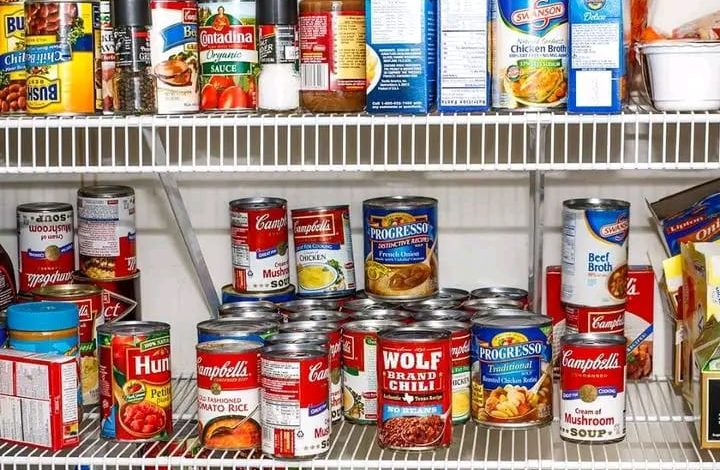
ADVERTISEMENT
The Truth About “Never-Expiring” Canned Foods: What You Should Really Know
Introduction:
In a world where food preservation and preparedness have become essential topics — especially in times of global uncertainty, economic challenges, or natural disasters — canned foods remain a pantry hero. The image above, featuring shelves full of neatly organized canned goods, proudly states: “15 canned foods that NEVER ever expire.” It’s a bold claim that catches attention — but is it true? Can any food truly last forever? This article dives into the reality behind long-lasting canned items, what “never expire” really means, and why these shelf-stable staples have earned their place in every home.
Body:
Canned foods have been a trusted source of nourishment for generations. The process of sealing food in airtight containers and heat-sterilizing them allows for extremely long shelf lives — often far beyond the printed “best by” dates. But do they truly never expire? Not quite, but some come impressively close when stored under proper conditions.
Here are a few canned foods often believed to “never expire” and why they last so long:
ADVERTISEMENT
-
Canned Beans – Black beans, kidney beans, and pinto beans can last for decades when stored in cool, dry conditions.
-
Canned Vegetables – Green beans, corn, and peas retain their integrity and nutritional value for many years.
-
Canned Tomatoes & Sauces – While they may slightly lose acidity over time, properly stored tomato paste or diced tomatoes can still be safe and useful well beyond the date.
-
Canned Tuna and Salmon – These protein-rich staples have been known to last over a decade in storage.
-
Canned Soups and Stews – Ready-to-eat meals like chicken noodle soup, beef stew, or chili offer longevity and convenience.
ADVERTISEMENT
-
Canned Chicken or Beef – Pressure-canned meats are popular in survival kits due to their shelf stability.
-
Canned Pasta Meals (like Spaghetti or Ravioli) – Contain preservatives and are sealed for long-term use.
-
Canned Pumpkin or Squash – Great for baking or hearty recipes, they hold up well over time.
-
Evaporated Milk – While not truly “eternal,” it has a long shelf life and is valuable for baking or cooking.
-
Canned Fruits in Syrup – The sugar content helps preserve fruits like peaches or pears for extended periods.
ADVERTISEMENT
-
Canned Coconut Milk – Widely used in cooking and baking, it holds up nicely in sealed containers.
-
Condensed Milk – Like its evaporated counterpart, it can last years when unopened.
-
Canned Broth or Stock – A base for soups and sauces, often lasting beyond 5 years if untouched.
-
Canned Cheese – Not common in every pantry, but available and surprisingly long-lasting.
-
Canned Pie Fillings – Apple, cherry, and more can remain viable for special occasions even years later.
ADVERTISEMENT
It’s important to note that while these items can last an impressively long time, no canned food lasts forever. Over time, texture, flavor, and nutritional content can degrade. Dents, rust, or bulging cans are signs that food is no longer safe to eat, regardless of its age.
Conclusion:
The phrase “never ever expire” may be a bit of an exaggeration, but the spirit behind it rings true: canned foods, when stored correctly, can last for years — sometimes even decades. They are an essential part of emergency preparedness, budgeting, and meal planning. The key is understanding how to rotate, inspect, and store these goods. Whether you’re stocking up for a storm, building a prepper pantry, or simply trying to waste less food, canned foods remain one of the most dependable and underrated resources available. So yes, some cans really do stand the test of time — and they might just be your secret weapon for future food security.




